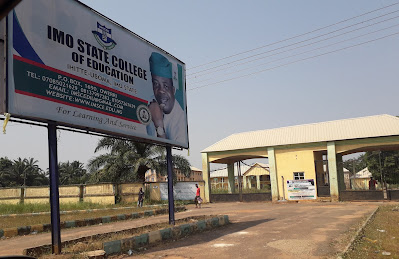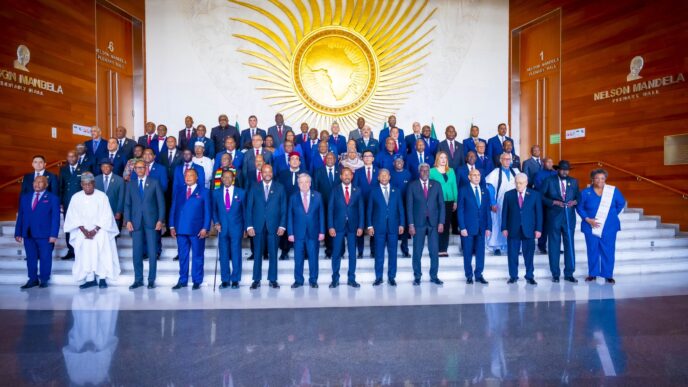Imo College of Education
BY OKOM EMMANUEL NJOR
In a shocking recent development, the Nigerian government has issued a stern warning that Colleges of Education with fewer than 1,000 students after three years of operation may lose their sponsorship from the Tertiary Education Trust Fund (TETFUND).
This new criterion for funding threatens to further exacerbate the deepening crisis in these institutions, which have long struggled with underfunding, societal neglect, and negative stereotypes.
While some may argue that the decision is a necessary one to ensure accountability, the truth is far more complicated – and tragic. These colleges are not the problem, but a symptom of a broader malaise in Nigeria’s educational system.
Advertisement
The struggle for prestige and recognition
From the very beginning, Colleges of Education have faced an uphill battle for recognition. While universities have long been seen as the pinnacle of academic achievement, Colleges of Education have not attracted the same level of interest or respect. Many secondary school leavers –who are capable of entering either a university or a college–are often driven by the pursuit of a university degree, believing that it holds the key to a secure and prosperous future. In many ways, a university degree is seen as the ticket to a stable career in Nigerian society, whether in the public or private sector.
The societal bias against teaching as a profession is as old as the Nigerian education system itself. It is often said that “the teacher’s reward is in heaven”–a notion that continues to persist even as other professions like medicine, law, and engineering enjoy higher levels of respect and financial security. If teaching were a more financially rewarding career, surely it would attract more talented young Nigerians. But as things stand, the narrative is clear: teaching is a fallback option, not a profession of choice.
Advertisement
Adding to the issue is the role played by the Joint Admissions and Matriculation Board (JAMB). The Board’s current allocation system disproportionately channels students who perform poorly in JAMB exams into Colleges of Education, further stigmatizing them. This practice reinforces the perception that Colleges of Education are a “dumping ground” for low-scoring candidates, rather than institutions dedicated to the serious training of educators.
In fact, according to a 2022 report by the National Universities Commission (NUC), a staggering 60% of applicants to Colleges of Education in Nigeria score below the minimum entry requirements for universities. This sends the signal to young Nigerians that the college route is for those who “didn’t make the cut,” further fuelling the perception that teaching is a less respectable career. As noted by an education expert, Professor Akintoye (2022), the lack of prestige associated with Colleges of Education is a critical issue that needs to be addressed, if we are to attract the best minds into the teaching profession. According to Akintoye, “A nation that does not prioritise the training of its educators will forever be shackled to mediocrity.”
A cultural shift: The need for change in perception
For any meaningful change to occur, there must be a cultural shift in how teaching and Colleges of Education are perceived. If teaching were to be elevated to the status of a prestigious and well-paid profession, more high-achieving students would choose to pursue education degrees. Teachers should be celebrated as the architects of the future, not relegated to the margins of society.
Advertisement
The reality in developed countries, where educators are some of the highest-paid professionals, starkly contrasts the situation in Nigeria. In countries like Finland, South Korea, and Singapore, teachers are highly respected and compensated for their pivotal role in shaping society. In Finland, for example, teachers are required to have Master’s degrees, and their salaries are among the highest in the public sector (Sahlberg, 2018). It is no wonder that these countries consistently top global education rankings. Nigeria, on the other hand, continues to view its teachers with disdain, offering them low wages, few incentives, and little recognition.
The lack of proper remuneration for Nigerian teachers is a grave injustice. While some may argue that increasing teachers’ salaries would be financially burdensome, it is important to recognise that investing in education is an investment in the future. Quality teaching yields better outcomes for students, which in turn leads to a more educated, productive workforce.
According to a 2020 report by the World Bank, countries that invest in education see long-term economic growth, increased innovation, and improved quality of life for their citizens. Thus, a commitment to better compensate teachers is not just an act of fairness – it is a strategic investment in the nation’s future.
The stark economic realities
Advertisement
At the heart of the issues bedevilling the teaching profession lies Nigeria’s economic reality. Teachers, despite their vital role, are often the most underpaid and overworked professionals in the country. The recent increase in the minimum wage has done little or nothing, to address the severe devaluation of the teacher’s purchasing power. With rising inflation, escalating cost of living, and stagnant wages, teachers’ salaries barely cover their basic needs. This grim situation has led many teachers to seek alternative means of supplementing their incomes, including unethical practices such as the sale of grades, commercialising project writing for students, general monetisation of students’ inadequacies in the course of pursuing their programmes, sexual exploitation, to mention but a few.
The government’s failure to address the root causes of teacher dissatisfaction and underfunding only compounds the issue. By placing the burden of low enrollment numbers in Colleges of Education squarely on the shoulders of the institutions themselves, the government is simply ignoring the systemic factors that contribute to this issue. The recent decision to withhold TETFUND sponsorship from Colleges of Education with fewer than 1,000 students is a misguided response that fails to address the structural and societal challenges facing these institutions.
Advertisement
The role of JAMB and the crisis of under-enrolment
The current crisis in Nigerian Colleges of Education is also deeply connected to JAMB’s admission policies. Despite its mandate to guide students into appropriate tertiary institutions, JAMB has largely ignored the needs of the Colleges of Education. In the current system, students who are unable to gain admission to universities are often funneled into these colleges, without consideration for the interests of the students or the colleges themselves.
Advertisement
JAMB’s distribution mechanism also fails to prioritise Colleges of Education, making it difficult for these institutions to attract the necessary number of students. Colleges of Education are left to contend with low enrolment numbers, despite their efforts to make education more accessible and relevant. The recent report from the Ministry of Education highlighted that several newly established Colleges of Education in remote areas, such as the Kogi State College of Education, have struggled with low enrolment due to regional security issues, ethnic clashes, and poor infrastructure (Federal Ministry of Education, 2023).
These challenges are compounded by the nationwide issue of underfunding, making it nearly impossible for these institutions to attract the desired number of students. However, the Federal College of Education (Technical), Ekiadolor, Benin, Edo State, Federal College of Education (FCE), Omu-Aran, Kwara State, Federal College of Education (FCE), Jalingo, Taraba State, Federal College of Education (FCE), Yola, Adamawa State, to mention but a few, are the real endangered species, more or less far below the 1,000 population threshold, on the brink of losing out on the beneficence of TETFUND sponsorship. Rather than penalising these institutions for factors beyond their control, the government should focus on finding solutions to address the systemic challenges that hinder enrolment. With the right support, these colleges can play a pivotal role in ensuring that Nigeria’s educational needs are met.
Advertisement
The call for reform and a vision for the future
In response to these challenges, the recent legalization of the status of the Colleges of Education to commence the Diploma and Degree programmes, popularly known as the Dual Mode, is a step in the right direction, to step up the game of these beleaguered colleges. Also, the ongoing discussions in the National Assembly, to transform Colleges of Education into Universities of Education, is another boost that may likely end the enrolment issue of the Colleges of Education, when the bill eventually becomes law. This move would help remove the stigma attached to these institutions and elevate their status in the eyes of prospective students.
Renaming these colleges as universities would symbolise a cultural shift in the way Nigerians perceive the profession of teaching, aligning it with other professions that are seen as prestigious and financially rewarding.
However, this rebranding alone will not be enough to solve the deeper issues plaguing these institutions. To truly revive Nigerian Colleges of Education, we must prioritise the following reforms:
(i) Increased funding and resources: Colleges of Education must be adequately funded to ensure that they have the resources necessary to deliver quality education. This includes better facilities, up-to-date curricula, and well-trained faculty members.
(ii) Teacher salaries: Teachers and teacher-lecturers must receive salaries that reflect their importance to society. Higher salaries will attract the best candidates into the profession and help retain experienced educators.
(iii) JAMB reform: JAMB must adjust its admission policies to ensure that Colleges of Education receive a fair share of applicants. Colleges should not be relegated to the sidelines but rather be given the resources and students they need to thrive.
(iv) Public awareness campaigns: The government and educational stakeholders should launch campaigns to raise awareness about the importance of the teaching profession. This could help change public attitudes towards teaching and inspire more students to pursue careers in education.
Conclusion: A national responsibility
As a nation, we must ask ourselves: do we truly value the educators who shape our future? The government’s decision to withdraw TETFUND support from Colleges of Education with fewer than 1,000 students is a devastating blow to an already struggling system. It is time for a fundamental shift in how we view the teaching profession and those who dedicate their lives to it. The Ministry of Education and TETFUND must reconsider their stance and offer the support that these colleges urgently need. This is not just a matter of funding – it is a matter of national survival.
Okom Emmanuel Njor (PhD) can be contacted via [email protected]
References
- Akintoye, O. (2022). Education in Nigeria: Rebuilding the foundation. Lagos: Nigerian Educational Publishers.
- Federal Ministry of Education. (2023). The status of teacher education in Nigeria: Challenges and prospects. Abuja: Government Press.
- National Universities Commission (NUC). (2023). Revised policies for the distribution of students across Nigerian tertiary institutions. Abuja: NUC.
- Sahlberg, P. (2018). Finnish lessons 2.0: What can the world learn from educational change in Finland? New York: Teachers College Press.
- World Bank. (2020). The importance of investing in education for economic growth. Washington, D.C.: World Bank Group.
Views expressed by contributors are strictly personal and not of TheCable.
Add a comment









